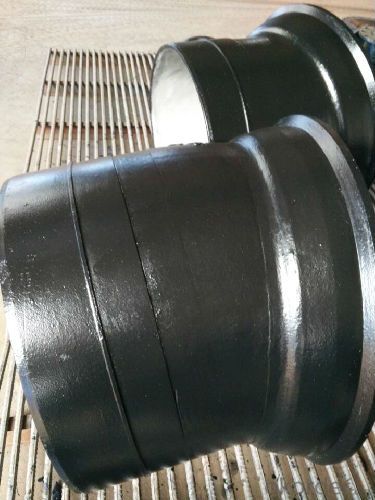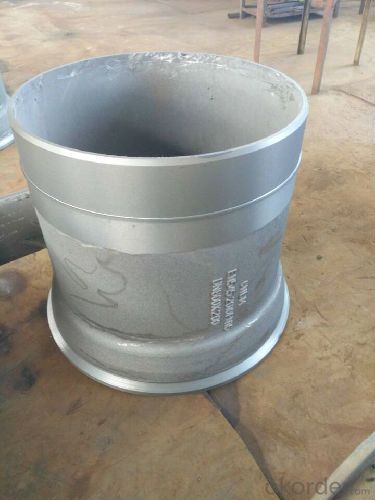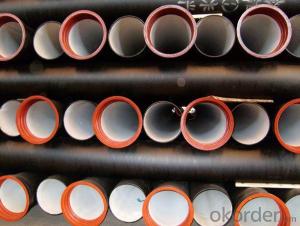Ductile Iron Self Restrained Pipe of China DN300 for Water Supply
- Loading Port:
- China main port
- Payment Terms:
- TT or LC
- Min Order Qty:
- 20 m.t.
- Supply Capability:
- 100000 m.t./month
OKorder Service Pledge
OKorder Financial Service
You Might Also Like
1,Ductile Iron Self Restrained Pipe Description :
The ductile iron self restrained pipe manufactured by SYI foundry are mainly used for conveying many fluid media such as water, oil and gas, are widely used in various pipeline projects for metallurgy, mine, water conservancy, petroleum and urban public service utility. Self-restrained joint adopts the T type joint sealing structure. Compared with T-type joint, adds a welded bead on spigot, and open-end locking ring, a gland and connecting bolts to provide the joint with good anti-slippage performance. The locking ring and the gland can slide between each other, so that the joint had certain axial stretching and deflection capability.
2,Main Features of the Ductile Iron Self Restrained Pipe:
The diameter is from DN 80 to DN 2000(Tyton, Class K7/9/14) under standard ISO2531 4179 8179 EN545, normally work length is 6 meters, Tyton socket-spigot, K9.
The ductile cast iron pipe, cast pipe & cast iron pipe manufactured by SYI is mainly used for conveying fluid media.
3,Ductile Iron Self Restrained Pipe Images:


4. Ductile Iron Self Restrained Pipe Specification
1. Material: Ductile iron grade 500-7/ 450-10 in accordance with ISO1083
2. Standard: ISO 2531, EN545, EN598, ANSI, AWWA
3. Certificate: ISO9001, ISO14001, SGS, NSF, WRAS
4. Test: In accordance with ISO 2531 / EN 545 / EN598 and 100% water pressure test
5. Length: 6m or cut into 5.6m, 5.7m, 5.8m
6. Internal Lining: Cement, conform to ISO4179
7. External coating: Zinc + Bitumen, conform to ISO8179
8. Rubber: NBR, SBR, EPDM according to ISO4633 / EN681.1
9. Note: The gaskets, bolts & nuts are supplied respectively as your special requirement
5.FAQ:
We have organized several common questions for our clients,may help you sincerely:
1.Q: Why would you choose ductile iron pipe rather than other pipe materials?
A:The reasons are obvious for that not only ductile iron pipe possesses the inherent strength and flexibility of ductile iron, combined with proven corrosion protection systems, but also the cost savings can be achieved from design to installation and commissioning.
2.Q:Why can you guarantee the inner of pipes can’t be corroded?
A: High alumina cement mortar lining and sulphate-resistant cement mortar lining. These two special linings are applicable to inner anti-corrosion for sewage pipes, improving resistance to erosion of the sewage components.
- Q:Can ductile iron pipes be used for gravity flow applications?
- Yes, ductile iron pipes can be used for gravity flow applications. Ductile iron pipes are known for their strength, durability, and ability to handle high-pressure flow, making them suitable for various gravity flow systems such as sewage, stormwater, and water distribution networks.
- Q:What is the expected joint performance of ductile iron pipes?
- Ductile iron pipes are widely recognized for their outstanding joint performance. They possess exceptional durability and strength, making them suitable for a wide range of applications, including water distribution, sewer systems, and industrial pipelines. One crucial aspect of joint performance in ductile iron pipes is their ability to withstand external loads and pressure. To ensure minimal leakage and long-term structural integrity, the joints in these pipes are designed to create a tight and secure connection. This is accomplished through the utilization of various joint types, such as push-on joints, mechanical joints, and restrained joints. Push-on joints are commonly employed in ductile iron pipes due to their ease of installation. They do not require any specialized tools or equipment. These joints rely on a rubber gasket, which guarantees a watertight seal and prevents leakage. On the other hand, mechanical joints involve the use of mechanical devices, such as bolts and nuts, to establish a rigid connection between the pipes. This type of joint provides additional strength and resistance against external forces. Ductile iron pipes have undergone extensive testing to ensure their performance meets or exceeds industry standards for pressure and bending strength. They exhibit high resistance to corrosion, resulting in a longer service life. Additionally, they are less susceptible to damage caused by ground movements or vibrations. These properties contribute to the overall joint performance of ductile iron pipes, ensuring reliable and efficient operation in various infrastructure systems. When properly installed and maintained, ductile iron pipes display remarkable joint performance. They provide a reliable and durable solution for numerous applications within the water and wastewater industry.
- Q:What is cast iron pipe, specification for cast iron pipe?
- Ductile iron pipes are more expensive, but the production methods are different.
- Q:What new technologies are there for the installation of ductile iron pipes?
- At present, the international general no faucet pipe hoop straight pipe and fittings (i.e. new flexible joint cast iron drainage pipes and fittings of the thesis), according to the interface type is divided into A type flexible interface (flange gland connection) and type W (flexible interface coupling connection) two, referred to as A type and W type.1.1 new flexible joint cast iron drainage pipe by centrifugal casting technology, has a compact structure, pipe wall thickness, the outer wall is smooth, no trachoma and slag, the tensile strength and compressive strength are high, products with stable chemical composition, corrosion resistance, fire retardant non-toxic, comply with fire safety requirements of environmental protection, no noise, no deformation, life. Long use.Type 1.2A: type A tube with high strength, low noise, good fireproof performance, long service life, with the advantages of flexibility and good seismic performance, but in the actual project that socket joints need larger installation space and the tube body is heavy, consumption of steel, especially in high-rise buildings it is difficult to accept by construction.
- Q:How do ductile iron pipes handle soil movement?
- Ductile iron pipes have the ability to handle soil movement well due to their flexible nature. They can withstand stress and strain caused by ground settlement, thermal expansion, and contraction, without cracking or breaking. The high tensile strength and elasticity of ductile iron allow it to adapt to shifting soil conditions, making it a reliable choice for underground installations.
- Q:Can ductile iron pipes be used for both water and sewer applications?
- Yes, ductile iron pipes can be used for both water and sewer applications. Ductile iron pipes have excellent strength, durability, and corrosion resistance, making them suitable for carrying both water and sewage. They are commonly used in various water supply and wastewater systems due to their ability to withstand high pressure and resist chemical reactions caused by sewage.
- Q:How does ductile iron pipe perform in areas with high soil stability?
- Ductile iron pipe performs exceptionally well in areas with high soil stability. Its robust and durable nature allows it to withstand the pressures exerted by the stable soil, ensuring a reliable and long-lasting performance. Additionally, the flexibility of ductile iron allows it to accommodate ground movements and settlement without compromising its integrity. Overall, ductile iron pipe is a suitable choice for areas with high soil stability, providing efficient and dependable water distribution and sewerage systems.
- Q:How are ductile iron pipes protected against erosion caused by high-velocity flow?
- Ductile iron pipes are protected against erosion caused by high-velocity flow through various methods and techniques. One common method is the application of protective coatings on the inner surface of the pipes. These coatings create a barrier between the flowing water and the pipe material, reducing the abrasive effects of the high-velocity flow. The coatings used may include epoxy, polyurethane, or cement-mortar lining, depending on the specific requirements of the application. Additionally, manufacturers often design the pipes with increased wall thickness in areas that are prone to erosion, such as bends or areas where the flow velocity is highest. This extra thickness provides additional strength and resistance against erosion. Another technique used to protect ductile iron pipes from erosion is the implementation of flow control devices, such as flow deflectors or velocity-reducing fittings. These devices help to redirect the flow and reduce its velocity, thereby minimizing the impact on the pipe walls. Regular maintenance and inspections are also crucial in preventing erosion. By monitoring the condition of the pipes and identifying any signs of erosion early on, appropriate measures can be taken to address the issue before it escalates. This may involve repairing or replacing damaged sections of the pipes, as well as implementing erosion control measures such as sediment filters or flow restrictors. Overall, a combination of protective coatings, design considerations, flow control devices, and proactive maintenance strategies are employed to ensure that ductile iron pipes are adequately protected against erosion caused by high-velocity flow.
- Q:Are there any special considerations for installing ductile iron pipe in rocky soils?
- Yes, there are special considerations for installing ductile iron pipe in rocky soils. The presence of rocks can pose challenges during the installation process as they can cause damage to the pipe or impede its proper alignment. Therefore, it is important to carefully assess the soil conditions and rock content at the installation site. Additional measures such as proper bedding and backfilling techniques, using protective coatings or linings, and employing specialized equipment may be necessary to ensure the durability and longevity of the ductile iron pipe in rocky soils.
- Q:Are ductile iron pipes susceptible to external loading or pressure?
- Ductile iron pipes, just like any other material, are susceptible to external loading or pressure. They possess a certain level of strength and tolerance to endure external forces. However, excessive external loading or pressure can result in the deformation or failure of these pipes. To avoid any harm caused by external loading, it is crucial to ensure proper installation and support of ductile iron pipes. Furthermore, the design and engineering of the pipeline system should take into account the expected external loading and pressure to guarantee the pipes' effectiveness in handling the anticipated conditions. Regular inspections and maintenance play a vital role in detecting and resolving issues associated with external loading or pressure that may arise over time.
1. Manufacturer Overview |
|
|---|---|
| Location | |
| Year Established | |
| Annual Output Value | |
| Main Markets | |
| Company Certifications | |
2. Manufacturer Certificates |
|
|---|---|
| a) Certification Name | |
| Range | |
| Reference | |
| Validity Period | |
3. Manufacturer Capability |
|
|---|---|
| a)Trade Capacity | |
| Nearest Port | |
| Export Percentage | |
| No.of Employees in Trade Department | |
| Language Spoken: | |
| b)Factory Information | |
| Factory Size: | |
| No. of Production Lines | |
| Contract Manufacturing | |
| Product Price Range | |
Send your message to us
Ductile Iron Self Restrained Pipe of China DN300 for Water Supply
- Loading Port:
- China main port
- Payment Terms:
- TT or LC
- Min Order Qty:
- 20 m.t.
- Supply Capability:
- 100000 m.t./month
OKorder Service Pledge
OKorder Financial Service
Similar products
New products
Hot products
Hot Searches
Related keywords


























